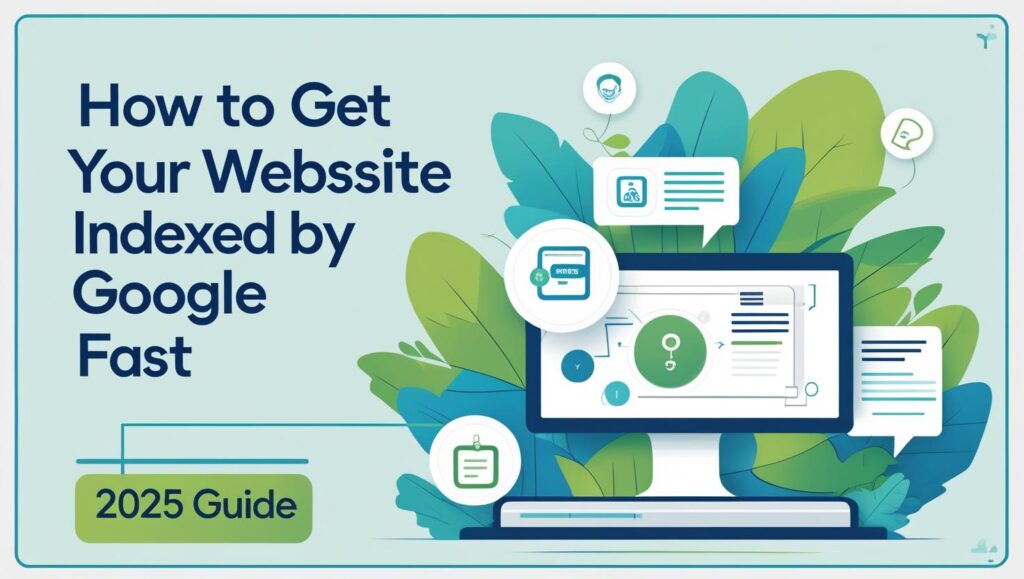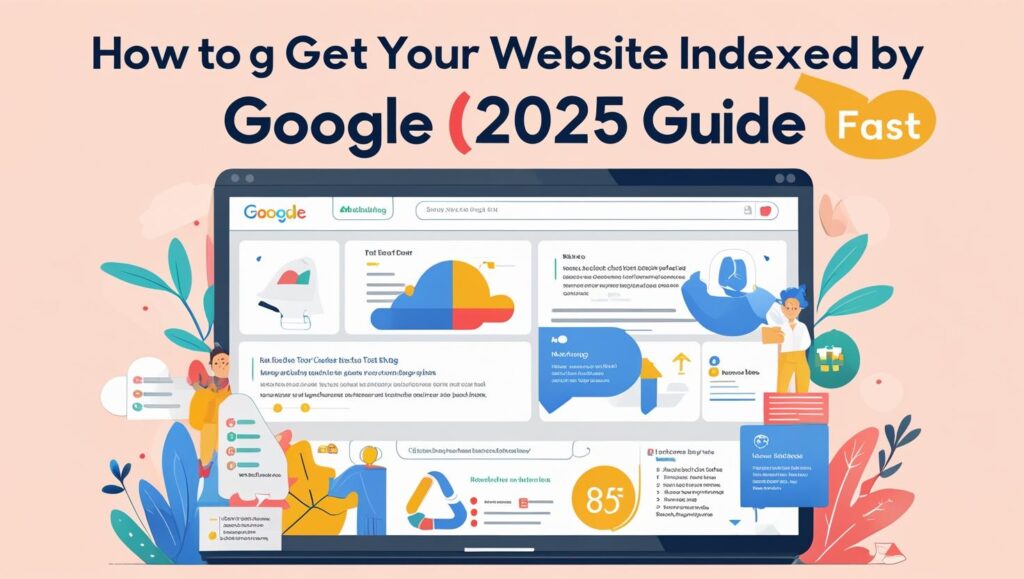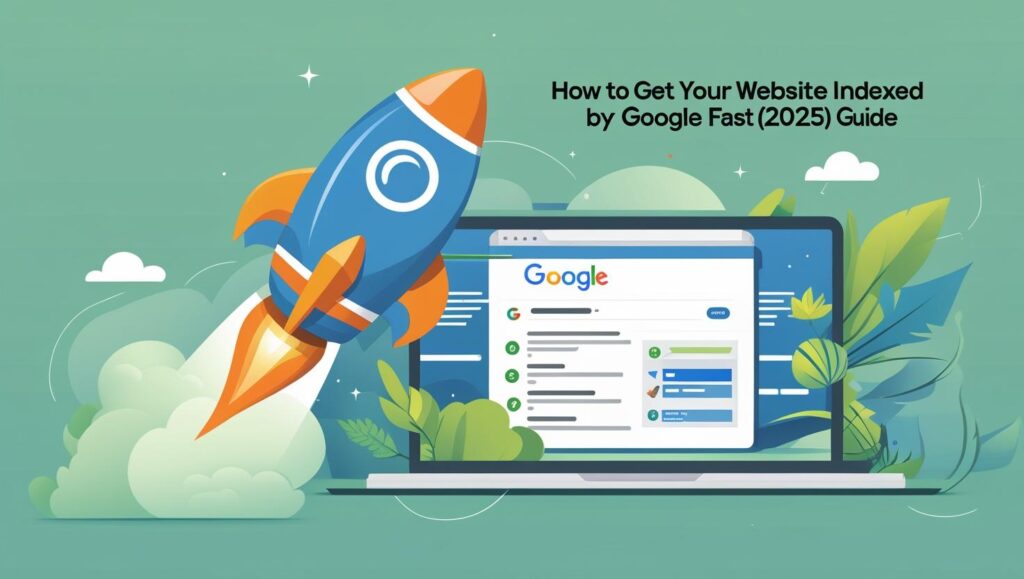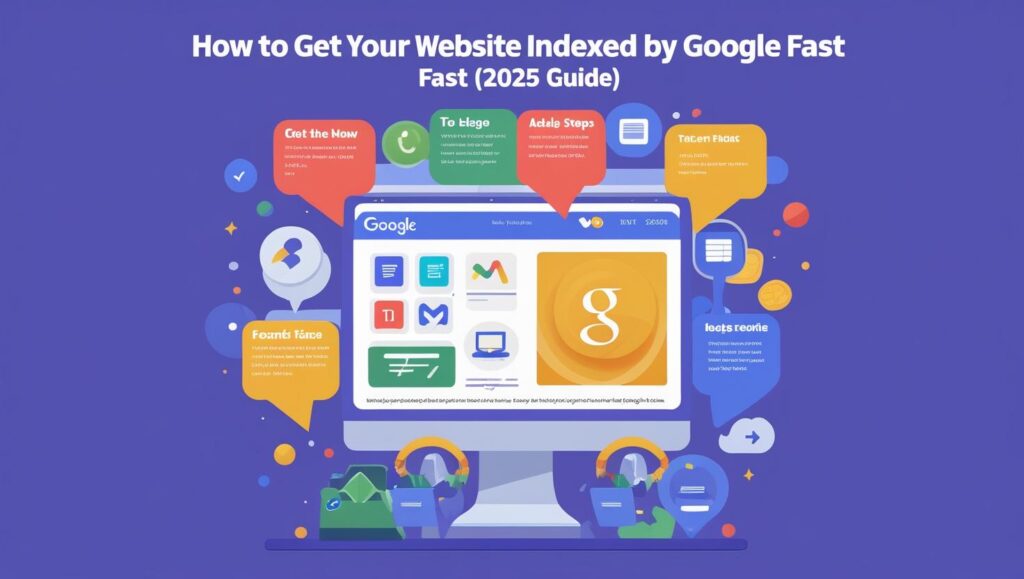Get website indexed by Google If your website isn’t indexed, it doesn’t exist on Google.
That’s right—no matter how beautiful or informative your site is, if Google hasn’t indexed it, your audience won’t find you in search results. Indexing is the first and most crucial step in SEO Get website indexed by Google.
Get website indexed by Google In this blog, you’ll learn exactly how to get your website indexed by Google—fast. Whether your site is new, redesigned, or you’ve just published fresh content, this guide gives you step-by-step tactics to speed up the process in 2025 Get website indexed by Google.

What Does Indexing Mean?
Get website indexed by Google Indexing is the process where Google’s crawler (Googlebot) visits your website, analyzes the content, and adds it to its searchable database—called the Google Index.
If your site isn’t in the index, it won’t appear in search results. Period.
How to Check if Your Site Is Indexed Get website indexed by Google
Method 1: Use Google Search
Type:
makefileCopyEditsite:yourdomain.com
Get website indexed by Google If pages appear in results, they’re indexed. If you see nothing, Google hasn’t indexed your site yet.
Method 2: Use Google Search Console
- Go to URL Inspection Tool
- Enter your URL
- It will tell you if it’s in the index and when it was last crawled
Why Isn’t My Website Indexed?
Some common reasons include:
- No backlinks or internal links
- Poor technical SEO
- No sitemap submitted
- Robots.txt blocking Googlebot
- Noindex meta tags
- Newly launched site with no authority
- Server issues or slow speed
Let’s now explore how to fix these issues and get your site indexed quickly.
1. Submit Your Website to Google Search Console Get website indexed by Google
This is the most direct method.
Steps:
- Visit Google Search Console
- Add your website as a property (use Domain or URL prefix)
- Verify ownership via DNS or HTML
- Use the URL Inspection Tool
- Click “Request Indexing”
Typically, Google will crawl it within a few hours to a few days.
2. Submit a Sitemap
A sitemap tells Google where to find all your site’s pages.
How to Submit:
- Create a sitemap (usually
yourdomain.com/sitemap.xml)- WordPress plugins like Yoast, Rank Math, or All in One SEO generate it automatically
- Go to Index > Sitemaps in GSC
- Paste the sitemap URL and hit “Submit”
Google will prioritize sitemap URLs for crawling and indexing.
3. Build Internal Links
Pages with zero links pointing to them are harder for Google to find.
What to Do:
- Link to new pages from older, indexed ones
- Use relevant anchor text
- Add your new page to the navigation menu or homepage
Pro Tip: Create a blog post roundup or “latest articles” section that links to new content.
4. Get Backlinks from Other Websites
Backlinks from external websites act as a “discovery signal” to Google.
How to Get Them:
- Guest posts
- Share content on Reddit, Quora, LinkedIn
- Ask partners to link to you
- Submit to relevant directories or forums
Even one good backlink can trigger Googlebot to crawl your site faster.
5. Add Your Site to Google Analytics
This alone won’t get your site indexed, but it sends trust signals to Google.
Steps:
- Sign up for Google Analytics
- Add tracking code to your site
- Link it with Google Search Console
Google connects your properties internally, which can lead to faster indexing.

6. Check Your Robots.txt File
A misconfigured robots.txt file can block Googlebot.
Check It At:
bashCopyEdityourdomain.com/robots.txt
Make sure it doesn’t include:
makefileCopyEditUser-agent: *
Disallow: /
A proper configuration:
makefileCopyEditUser-agent: *
Disallow:
Sitemap: https://yourdomain.com/sitemap.xml
7. Remove “Noindex” Meta Tags
If your pages have the following tag, Google won’t index them:
htmlCopyEdit<meta name="robots" content="noindex">
Use a crawler like Screaming Frog or plugins like Rank Math to scan and fix this.

8. Improve Site Speed & Performance
A slow-loading site may be crawled less frequently.
Improve by:
- Compressing images
- Using caching (via plugins)
- Leveraging CDNs (Cloudflare, BunnyCDN)
- Minimizing JavaScript and CSS
Use tools like:
Faster websites = better crawl efficiency.
9. Regularly Update Content
Fresh content attracts crawlers. If you don’t update your site, Google visits less often.
Tips:
- Update old blog posts
- Add new articles regularly
- Create “hub” pages that link to new posts
You can also add timestamps (Last updated) to show freshness.
10. Ensure Mobile-Friendliness
Google uses mobile-first indexing.
Check your site:
- Use GSC’s Mobile Usability report
- Or try Google Mobile-Friendly Test
Make sure:
- Text is readable
- Buttons are tappable
- Layout adjusts to screen size
11. Use Structured Data (Schema Markup)
Schema helps Google understand your content better and index it more efficiently.
Use JSON-LD format:
Examples:
- Blog Post
- Product
- FAQ
- Event
WordPress users can use plugins like:
- Schema Pro
- Rank Math
- Yoast SEO
Validate with: https://validator.schema.org/
12. Ping Google with an API or Plugin
Tools like Instant Indexing API (for Bing or Google) can notify search engines automatically.
WordPress Plugin:
- Rank Math’s Instant Indexing (for Bing API and Google Indexing API—mostly for job/streaming sites, but can help)
Note: Google limits use of Indexing API to certain content types, but pings still help discovery.
13. Share on Social Media & Aggregator Sites Get website indexed by Google
While social signals aren’t a direct ranking factor, they help discovery.
Where to Share:
- Twitter/X
- Reddit (relevant subreddits)
- Quora answers with links
- Medium or Blogger republishing
- Facebook groups
Google crawls frequently indexed platforms—your link there boosts visibility.

14. Avoid Duplicate Content Get website indexed by Google
If your content is copied or appears elsewhere first, Google might not index it at all.
Tips:
- Use original writing
- Avoid scraping
- Add canonical tags to avoid internal duplication
- Use plagiarism checkers before publishing
15. Don’t Rely on Just Waiting
Get website indexed by Google Waiting passively won’t help in 2025. Google has billions of sites to crawl, and if you don’t actively signal your content’s value, indexing can take weeks—or not happen at all.
Recap: Fast Indexing Checklist
| Action | Priority |
|---|---|
| Submit site to Google Search Console | Essential |
| Add and submit sitemap | Must-do |
| Use URL Inspection Tool | Fast-track index |
| Fix robots.txt and meta noindex issues | Critical |
| Build internal & external links | Boost crawl frequency |
| Share on social and forums | Discovery aid |
| Use schema & fast loading | Optimization |
| Update content regularly | Encourages re-crawling |
Final Thoughts
Indexing is the foundation of SEO success. If Google can’t find and understand your site, no SEO technique will matter.
Get website indexed by Google By following these strategies, you’re not just getting indexed faster—you’re building a healthier, crawl-friendly website that Google wants to feature in its search results.
Don’t wait. Take action today to get your site indexed fast and show up where it matters—on the first page of Google.
